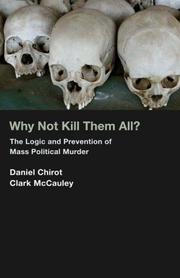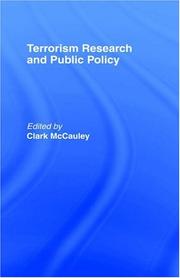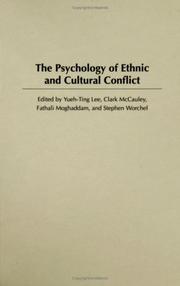| Listing 1 - 10 of 14 | << page >> |
Sort by
|

ISBN: 1282936220 9786612936227 1400834856 9781400834853 6612936223 9780691145945 0691145946 9780691092966 0691092966 Year: 2010 Publisher: Princeton (N.J.) Princeton University Press
Abstract | Keywords | Export | Availability | Bookmark
 Loading...
Loading...Choose an application
- Reference Manager
- EndNote
- RefWorks (Direct export to RefWorks)
Genocide, mass murder, massacres. The words themselves are chilling, evoking images of the slaughter of countless innocents. What dark impulses lurk in our minds that even today can justify the eradication of thousands and even millions of unarmed human beings caught in the crossfire of political, cultural, or ethnic hostilities? This question lies at the heart of Why Not Kill Them All? Cowritten by historical sociologist Daniel Chirot and psychologist Clark McCauley, the book goes beyond exploring the motives that have provided the psychological underpinnings for genocidal killings. It offers a historical and comparative context that adds up to a causal taxonomy of genocidal events. Rather than suggesting that such horrors are the product of abnormal or criminal minds, the authors emphasize the normality of these horrors: killing by category has occurred on every continent and in every century. But genocide is much less common than the imbalance of power that makes it possible. Throughout history human societies have developed techniques aimed at limiting intergroup violence. Incorporating ethnographic, historical, and current political evidence, this book examines the mechanisms of constraint that human societies have employed to temper partisan passions and reduce carnage. Might an understanding of these mechanisms lead the world of the twenty-first century away from mass murder? Why Not Kill Them All? makes clear that there are no simple solutions, but that progress is most likely to be made through a combination of international pressures, new institutions and laws, and education. If genocide is to become a grisly relic of the past, we must fully comprehend the complex history of violent conflict and the struggle between hatred and tolerance that is waged in the human heart. In a new preface, the authors discuss recent mass violence and reaffirm the importance of education and understanding in the prevention of future genocides.
Genocide. --- Social conflict. --- Conflict management. --- Genocide --- Conflict control --- Conflict resolution --- Dispute settlement --- Management of conflict --- Managing conflict --- Management --- Negotiation --- Problem solving --- Social conflict --- Crisis management --- Class conflict --- Class struggle --- Conflict, Social --- Social tensions --- Interpersonal conflict --- Social psychology --- Sociology --- Cleansing, Ethnic --- Ethnic cleansing --- Ethnic purification --- Ethnocide --- Purification, Ethnic --- Crime --- Prevention.

ISBN: 0714634298 Year: 1991 Publisher: London : Cass,
Abstract | Keywords | Export | Availability | Bookmark
 Loading...
Loading...Choose an application
- Reference Manager
- EndNote
- RefWorks (Direct export to RefWorks)
Terrorism --- Terrorists --- Government policy. --- Psychological aspects. --- Psychology.
Digital
ISBN: 9781400834853 9780691145945 Year: 2010 Publisher: Princeton, N.J. Princeton University Press
Abstract | Keywords | Export | Availability | Bookmark
 Loading...
Loading...Choose an application
- Reference Manager
- EndNote
- RefWorks (Direct export to RefWorks)

ISBN: 9780691092966 0691092966 Year: 2006 Publisher: Princeton, N.J. : Princeton University Press,
Abstract | Keywords | Export | Availability | Bookmark
 Loading...
Loading...Choose an application
- Reference Manager
- EndNote
- RefWorks (Direct export to RefWorks)
Genocide, mass murder, massacres. The words themselves are chilling, evoking images of the slaughter of countless innocents. What dark impulses lurk in our minds that even today can justify the eradication of thousands and even millions of unarmed human beings caught in the crossfire of political, cultural, or ethnic hostilities? This question lies at the heart of 'Why Not Kill Them All?' Cowritten by historical sociologist Daniel Chirot and psychologist Clark McCauley, the book goes beyond exploring the motives that have provided the psychological underpinnings for genocidal killings. It offers a historical and comparative context that adds up to a causal taxonomy of genocidal events. Rather than suggesting that such horrors are the product of abnormal or criminal minds, the authors emphasize the normality of these horrors: killing by category has occurred on every continent and in every century. But genocide is much less common than the imbalance of power that makes it possible. Throughout history human societies have developed techniques aimed at limiting intergroup violence. Incorporating ethnographic, historical, and current political evidence, this book examines the mechanisms of constraint that human societies have employed to temper partisan passions and reduce carnage. Might an understanding of these mechanisms lead the world of the twenty-first century away from mass murder? 'Why Not Kill Them All?' makes clear that there are no simple solutions, but that progress is most likely to be made through a combination of international pressures, new institutions and laws, and education. If genocide is to become a grisly relic of the past, we must fully comprehend the complex history of violent conflict and the struggle between hatred and tolerance that is waged in the human heart.
Genocide. --- Social conflict. --- Conflict management. --- Genocide --- Génocide --- Conflits sociaux --- Gestion des conflits --- Prevention. --- Prévention --- Conflict control --- Conflict resolution --- Dispute settlement --- Management of conflict --- Managing conflict --- Management --- Negotiation --- Problem solving --- Social conflict --- Crisis management --- Class conflict --- Class struggle --- Conflict, Social --- Social tensions --- Interpersonal conflict --- Social psychology --- Sociology --- Cleansing, Ethnic --- Ethnic cleansing --- Ethnic purification --- Ethnocide --- Purification, Ethnic --- Crime --- Génocide --- Prévention --- Conflict management --- Prevention
Book
ISBN: 9780199747436 0199747431 Year: 2011 Publisher: Oxford: Oxford university press,
Abstract | Keywords | Export | Availability | Bookmark
 Loading...
Loading...Choose an application
- Reference Manager
- EndNote
- RefWorks (Direct export to RefWorks)
This accessible book identifies twelve mechanisms of political radicalization that can move individuals, groups, and the masses to increased sympathy and support for political violence. Terrorism is an extreme form of radicalization, and the book describes pathways to terrorism to demonstrate the twelve mechanisms at work. Written by two psychologists who are acknowledged radicalization experts and consultants to the Department of Homeland Security, Friction draws heavily on case histories. The case material is wide-ranging - drawn from Russia in the late 1800s, the US in the 1970s, and the ra
Radicalism --- Political violence --- Terrorism --- Psychological aspects --- Psychological aspects. --- Political violence -- Psychological aspects. --- Radicalization -- Psychological aspects. --- Terrorism -- Psychological aspects. --- Radicalization --- Sociology & Social History --- Social Sciences --- Social Conditions --- Violence --- Political crimes and offenses --- Radicalisation --- Political science --- Extremism, Political --- Ideological extremism --- Political extremism --- Radicalism - Psychological aspects --- Political violence - Psychological aspects --- Terrorism - Psychological aspects
Book
ISBN: 0190862580 9780190862589 9780190862596 0190862599 Year: 2020 Publisher: New York: Oxford university press,
Abstract | Keywords | Export | Availability | Bookmark
 Loading...
Loading...Choose an application
- Reference Manager
- EndNote
- RefWorks (Direct export to RefWorks)
In the recent years, terrorism and radicalization have (unfortunately) become something of a regular topic in the news, in movies and TV shows, and even in dinnertime conversations. It seems like everyone knows something and has a theory or two to explain the growing number of terrorist attacks around the world. Some blame it on Muslims, some on the news media and the Internet, and some on the CIA and the U.S. government. It has become difficult to judge the quality of all this information. Thus, it makes sense to ask for credentials of the messengers.
Radicalism --- Radicalization --- Terrorism
Book
ISBN: 1282087843 9786612087844 1400827329 Year: 2006 Publisher: Princeton, N.J. : Princeton University Press,
Abstract | Keywords | Export | Availability | Bookmark
 Loading...
Loading...Choose an application
- Reference Manager
- EndNote
- RefWorks (Direct export to RefWorks)
Genocide, mass murder, massacres. The words themselves are chilling, evoking images of the slaughter of countless innocents. What dark impulses lurk in our minds that even today can justify the eradication of thousands and even millions of unarmed human beings caught in the crossfire of political, cultural, or ethnic hostilities? This question lies at the heart of Why Not Kill Them All? Cowritten by historical sociologist Daniel Chirot and psychologist Clark McCauley, the book goes beyond exploring the motives that have provided the psychological underpinnings for genocidal killings.
Genocide. --- Social conflict. --- Conflict management. --- Genocide --- Prevention.
Book
ISBN: 0199845441 1282977342 9786612977343 0199781125 Year: 2011 Publisher: Oxford ; New York : Oxford University Press,
Abstract | Keywords | Export | Availability | Bookmark
 Loading...
Loading...Choose an application
- Reference Manager
- EndNote
- RefWorks (Direct export to RefWorks)
This accessible book identifies twelve mechanisms of political radicalization that can move individuals, groups, and the masses to increased sympathy and support for political violence. Terrorism is an extreme form of radicalization, and the book describes pathways to terrorism to demonstrate the twelve mechanisms at work. Written by two psychologists who are acknowledged radicalization experts and consultants to the Department of Homeland Security, Friction draws heavily on case histories. The case material is wide-ranging - drawn from Russia in the late 1800's, the US in the 1970's,
Radicalism --- Political violence --- Terrorism --- Psychological aspects.
Book
ISBN: 9780190629328 0190629320 9780190629335 0190629339 9780190624927 0190624922 Year: 2011 Publisher: Oxford New York
Abstract | Keywords | Export | Availability | Bookmark
 Loading...
Loading...Choose an application
- Reference Manager
- EndNote
- RefWorks (Direct export to RefWorks)

ISBN: 9780275979836 Year: 2004 Publisher: Westport (Conn.) Praeger
Abstract | Keywords | Export | Availability | Bookmark
 Loading...
Loading...Choose an application
- Reference Manager
- EndNote
- RefWorks (Direct export to RefWorks)
| Listing 1 - 10 of 14 | << page >> |
Sort by
|

 Search
Search Feedback
Feedback About UniCat
About UniCat  Help
Help News
News